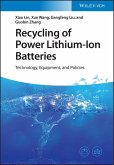Electrocatalysis for Membrane Fuel Cells (eBook, PDF)
Methods, Modeling, and Applications
Redaktion: Alonso-Vante, Nicolas; Di Noto, Vito
160,99 €
160,99 €
inkl. MwSt.
Sofort per Download lieferbar

0 °P sammeln
160,99 €
Als Download kaufen

160,99 €
inkl. MwSt.
Sofort per Download lieferbar

0 °P sammeln
Jetzt verschenken
Alle Infos zum eBook verschenken
160,99 €
inkl. MwSt.
Sofort per Download lieferbar
Alle Infos zum eBook verschenken

0 °P sammeln
Electrocatalysis for Membrane Fuel Cells (eBook, PDF)
Methods, Modeling, and Applications
Redaktion: Alonso-Vante, Nicolas; Di Noto, Vito
- Format: PDF
- Merkliste
- Auf die Merkliste
- Bewerten Bewerten
- Teilen
- Produkt teilen
- Produkterinnerung
- Produkterinnerung

Bitte loggen Sie sich zunächst in Ihr Kundenkonto ein oder registrieren Sie sich bei
bücher.de, um das eBook-Abo tolino select nutzen zu können.
Hier können Sie sich einloggen
Hier können Sie sich einloggen
Sie sind bereits eingeloggt. Klicken Sie auf 2. tolino select Abo, um fortzufahren.

Bitte loggen Sie sich zunächst in Ihr Kundenkonto ein oder registrieren Sie sich bei bücher.de, um das eBook-Abo tolino select nutzen zu können.
Presenting comprehensively the field of electrocatalysis for fuel cells, including different systems, effective characterization methods, classes of electrocatalytic materials and more. A high-quality reference for everyone working in this field.
- Geräte: PC
- mit Kopierschutz
- eBook Hilfe
- Größe: 14.65MB
Andere Kunden interessierten sich auch für
![Electrocatalysis for Membrane Fuel Cells (eBook, ePUB) Electrocatalysis for Membrane Fuel Cells (eBook, ePUB)]() Electrocatalysis for Membrane Fuel Cells (eBook, ePUB)160,99 €
Electrocatalysis for Membrane Fuel Cells (eBook, ePUB)160,99 €![Flow Batteries (eBook, PDF) Flow Batteries (eBook, PDF)]() Flow Batteries (eBook, PDF)376,99 €
Flow Batteries (eBook, PDF)376,99 €![Alkaline Anion Exchange Membranes for Fuel Cells (eBook, PDF) Alkaline Anion Exchange Membranes for Fuel Cells (eBook, PDF)]() Alkaline Anion Exchange Membranes for Fuel Cells (eBook, PDF)142,99 €
Alkaline Anion Exchange Membranes for Fuel Cells (eBook, PDF)142,99 €![Rechargeable Organic Batteries (eBook, PDF) Rechargeable Organic Batteries (eBook, PDF)]() Yongzhu FuRechargeable Organic Batteries (eBook, PDF)124,99 €
Yongzhu FuRechargeable Organic Batteries (eBook, PDF)124,99 €![Zinc-Air Batteries (eBook, PDF) Zinc-Air Batteries (eBook, PDF)]() Zinc-Air Batteries (eBook, PDF)124,99 €
Zinc-Air Batteries (eBook, PDF)124,99 €![Recycling of Power Lithium-Ion Batteries (eBook, PDF) Recycling of Power Lithium-Ion Batteries (eBook, PDF)]() Xiao LinRecycling of Power Lithium-Ion Batteries (eBook, PDF)111,99 €
Xiao LinRecycling of Power Lithium-Ion Batteries (eBook, PDF)111,99 €![Principles and Applications of Lithium Secondary Batteries (eBook, PDF) Principles and Applications of Lithium Secondary Batteries (eBook, PDF)]() Principles and Applications of Lithium Secondary Batteries (eBook, PDF)133,99 €
Principles and Applications of Lithium Secondary Batteries (eBook, PDF)133,99 €-
-
-
Presenting comprehensively the field of electrocatalysis for fuel cells, including different systems, effective characterization methods, classes of electrocatalytic materials and more. A high-quality reference for everyone working in this field.
Dieser Download kann aus rechtlichen Gründen nur mit Rechnungsadresse in A, B, BG, CY, CZ, D, DK, EW, E, FIN, F, GR, HR, H, IRL, I, LT, L, LR, M, NL, PL, P, R, S, SLO, SK ausgeliefert werden.
Produktdetails
- Produktdetails
- Verlag: Ernst & Sohn
- Seitenzahl: 576
- Erscheinungstermin: 6. September 2023
- Englisch
- ISBN-13: 9783527830558
- Artikelnr.: 68884995
- Verlag: Ernst & Sohn
- Seitenzahl: 576
- Erscheinungstermin: 6. September 2023
- Englisch
- ISBN-13: 9783527830558
- Artikelnr.: 68884995
- Herstellerkennzeichnung Die Herstellerinformationen sind derzeit nicht verfügbar.
Nicolas Alonso-Vante is emeritus Professor since September 2021 at the University of Poitiers. In the field of materials science, electrocatalysis and photoelectrocatalysis, he has authored over 250 peer-reviewed publications, book chapters, editor of a two-volume e-book on electrochemistry in Spanish, author of two books and six patents, with more than 10320 citations and an h-index of 55 (ResearchGate). He has received the awards of the National Polytechnic Institute-Mexico as a R&D distinguished graduate, the Mexican Council of Technology SNI-III recognition as a Mexican researcher working outside Mexico, and has been awarded the NM Emanuel Medal from the Russian Academy of Science. Vito Di Noto is Full Professor of Electrochemistry for Energy and Solid-State Chemistry in the Department of Industrial Engineering of the University of Padova, Italy. He is Fellow of the Electrochemical Society, Past-President of the Electrochemical Division of the Italian Chemical Society and the recipient of the "Energy Technology Division Award" of The Electrochemical Society. In the field of advanced functional materials for electrochemical energy conversion and storage device, he is author of more than 335 international publications, with more than 9200 citations and an h-index of 54 (Google Scholar). He is inventor of more than 30 international patents.
Overview of Systems
Chapter 1 System-Level Constraints on Fuel Cell Materials and Electrocatalysts
Chapter 2 Fuel cell design from the atom to the automobile
Basics-Fundamentals
Chapter 3 Electrochemical Fundamentals
Chapter 4 Quantifying the kinetic parameters of fuel cell reactions
Chapter 5 Adverse and Beneficial functions of Surface Layers formed on Fuel Cell Electrocatalysts
State of the art
Chapter 6 Design of PGM-free ORR Catalysts: from Molecular to the State-of-the-Art
Chapter 7 Recent advances in Electrocatalysts for hydrogen oxidation reaction in Alkaline Electrolytes
Membranes for Fuel Cells
Chapter 8 Supports for Oxygen Reduction Catalysts: Understanding and Improving Structure, Stability and Activity
Physical Chemical Characterization
Chapter 9 Understanding the electrocatalytic reaction in the fuel cell by tracking the dynamics of the catalyst by X-ray
absorption spectroscopy
Modeling
Chapter 10 Unraveling local electrocatalytic conditions with theory and computation
Protocols
Chapter 11 Quantifying the Activity of Electrocatalysts
Chapter 12 Durability of Fuel Cell Electrocatalysts and Methods for Performance Assessment
Systems
Chapter 13 Modelling of polymer electrolyte membrane fuel cells
Chapter 14 Physics-based modelling of polymer electrolyte membrane fuel cells: From cell to automotive systems
Chapter 1 System-Level Constraints on Fuel Cell Materials and Electrocatalysts
Chapter 2 Fuel cell design from the atom to the automobile
Basics-Fundamentals
Chapter 3 Electrochemical Fundamentals
Chapter 4 Quantifying the kinetic parameters of fuel cell reactions
Chapter 5 Adverse and Beneficial functions of Surface Layers formed on Fuel Cell Electrocatalysts
State of the art
Chapter 6 Design of PGM-free ORR Catalysts: from Molecular to the State-of-the-Art
Chapter 7 Recent advances in Electrocatalysts for hydrogen oxidation reaction in Alkaline Electrolytes
Membranes for Fuel Cells
Chapter 8 Supports for Oxygen Reduction Catalysts: Understanding and Improving Structure, Stability and Activity
Physical Chemical Characterization
Chapter 9 Understanding the electrocatalytic reaction in the fuel cell by tracking the dynamics of the catalyst by X-ray
absorption spectroscopy
Modeling
Chapter 10 Unraveling local electrocatalytic conditions with theory and computation
Protocols
Chapter 11 Quantifying the Activity of Electrocatalysts
Chapter 12 Durability of Fuel Cell Electrocatalysts and Methods for Performance Assessment
Systems
Chapter 13 Modelling of polymer electrolyte membrane fuel cells
Chapter 14 Physics-based modelling of polymer electrolyte membrane fuel cells: From cell to automotive systems
Overview of Systems
Chapter 1 System-Level Constraints on Fuel Cell Materials and Electrocatalysts
Chapter 2 Fuel cell design from the atom to the automobile
Basics-Fundamentals
Chapter 3 Electrochemical Fundamentals
Chapter 4 Quantifying the kinetic parameters of fuel cell reactions
Chapter 5 Adverse and Beneficial functions of Surface Layers formed on Fuel Cell Electrocatalysts
State of the art
Chapter 6 Design of PGM-free ORR Catalysts: from Molecular to the State-of-the-Art
Chapter 7 Recent advances in Electrocatalysts for hydrogen oxidation reaction in Alkaline Electrolytes
Membranes for Fuel Cells
Chapter 8 Supports for Oxygen Reduction Catalysts: Understanding and Improving Structure, Stability and Activity
Physical Chemical Characterization
Chapter 9 Understanding the electrocatalytic reaction in the fuel cell by tracking the dynamics of the catalyst by X-ray
absorption spectroscopy
Modeling
Chapter 10 Unraveling local electrocatalytic conditions with theory and computation
Protocols
Chapter 11 Quantifying the Activity of Electrocatalysts
Chapter 12 Durability of Fuel Cell Electrocatalysts and Methods for Performance Assessment
Systems
Chapter 13 Modelling of polymer electrolyte membrane fuel cells
Chapter 14 Physics-based modelling of polymer electrolyte membrane fuel cells: From cell to automotive systems
Chapter 1 System-Level Constraints on Fuel Cell Materials and Electrocatalysts
Chapter 2 Fuel cell design from the atom to the automobile
Basics-Fundamentals
Chapter 3 Electrochemical Fundamentals
Chapter 4 Quantifying the kinetic parameters of fuel cell reactions
Chapter 5 Adverse and Beneficial functions of Surface Layers formed on Fuel Cell Electrocatalysts
State of the art
Chapter 6 Design of PGM-free ORR Catalysts: from Molecular to the State-of-the-Art
Chapter 7 Recent advances in Electrocatalysts for hydrogen oxidation reaction in Alkaline Electrolytes
Membranes for Fuel Cells
Chapter 8 Supports for Oxygen Reduction Catalysts: Understanding and Improving Structure, Stability and Activity
Physical Chemical Characterization
Chapter 9 Understanding the electrocatalytic reaction in the fuel cell by tracking the dynamics of the catalyst by X-ray
absorption spectroscopy
Modeling
Chapter 10 Unraveling local electrocatalytic conditions with theory and computation
Protocols
Chapter 11 Quantifying the Activity of Electrocatalysts
Chapter 12 Durability of Fuel Cell Electrocatalysts and Methods for Performance Assessment
Systems
Chapter 13 Modelling of polymer electrolyte membrane fuel cells
Chapter 14 Physics-based modelling of polymer electrolyte membrane fuel cells: From cell to automotive systems







